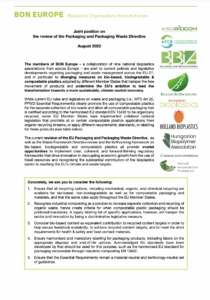 The current revision of the EU Packaging and Packaging Waste Directive (PPWD), as well as the Waste Framework Directive (WFD) review and the forthcoming framework on bio-based, biodegradable and compostable plastics provide crucial opportunities to fully acknowledge the role of bioplastics in a circular economy.
The current revision of the EU Packaging and Packaging Waste Directive (PPWD), as well as the Waste Framework Directive (WFD) review and the forthcoming framework on bio-based, biodegradable and compostable plastics provide crucial opportunities to fully acknowledge the role of bioplastics in a circular economy.
The Bioplastics Organisation Network (BON) Europe, a collaboration of nine national bioplastics associations from across Europe, has published a joint position to raise some crucial concerns on the current policy developments, and in particular on the diverging measures on bio-based, biodegradable & compostable plastics adopted by different Member States that hamper the free movement of products and undermine the EU’s ambition to lead the transformation towards a more sustainable, climate neutral economy.
The group formulates five concrete policy recommendations for the upcoming revision of the PPWD:
- Ensure that all recycling options, including mechanical, organic, and chemical recycling are available for bio-based, non-biodegradable as well as compostable packaging.
- Recognise industrial composting as a solution to increase collection and recycling of organic waste, hence create criteria for when compostable plastic packaging should be preferred/mandatory.
- Consider bio-based content as equivalent contribution to recycled content targets.
- Ensure harmonised and mandatory labelling for packaging products using acknowledged EU standards, such as the standard for packaging recoverable through industrial composting EN 13432.
- Ensure that the Essential Requirements for Packaging remain material-and technology-neutral.
The BON Europe members especially emphasize the need for coherent rules to ensure access to all recycling options, including mechanical, organic, and chemical recycling; and no hierarchy should be set among the different types of recycling technologies: compostable plastics, bio-based content, and recycled content should all have equal value in the development of the legislative proposal of the PPWD. Bioplastics can be treated in established recycling and recovery streams and offer additional options such as organic and chemical recycling. Standard industry sorting technologies, like NIR, are perfectly able to sort bio-based and compostable plastics from other plastic waste. Especially considering the upcoming mandatory separate collection of bio-waste by 2024, which will increase the amount of bio-waste (especially food waste) that will enter industrial composting and anaerobic digestion (AD) facilities, investments are needed to achieve an acceptable, higher functioning and more harmonised landscape. Certified compostable plastic packaging (EN 13432) can substantially contribute to reach the food-waste collection targets and to reduce the contamination (with conventional plastics) of the organic waste streams.
While some EU Member States are setting best practice on how bioplastics can unfold their full potential, others are stalling innovation and development in this sector. BON Europe’s position paper includes an overview of current national rules across the EU-27 on compostable plastic packaging and other applications, which highlights the urgent need for harmonised rules and a fair and level playing field for bio-based and compostable plastics. If designed correctly, the current legislative revision processes could establish a coherent and supportive regulatory environment for bioplastics that helps to overcome existing barriers and foster development.
The publication of the European Commission’s proposal of the revised PPWD as well as the policy framework for bio-based, biodegradable and compostable plastics is announced for the 30 November 2022. A clear, coherent, and forward-thinking framework is paramount to ensure reliability in decision-making and investment, and to decouple economic growth from the use of fossil resources by recognising the substantial contribution of the bioplastics sector in reaching the EU’s climate and waste targets. Click here to read the BON position paper.